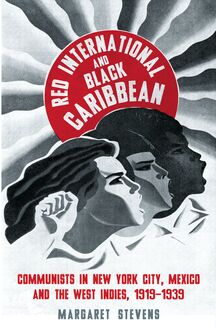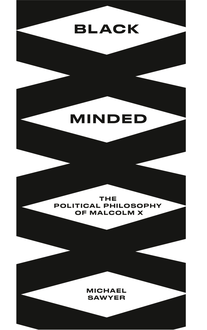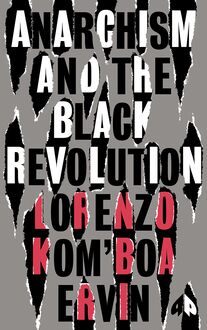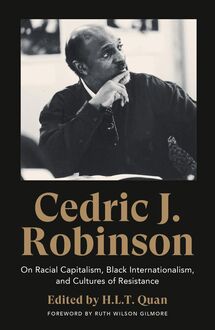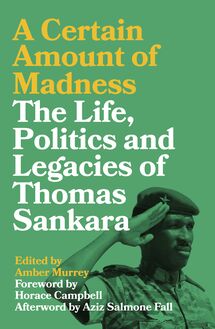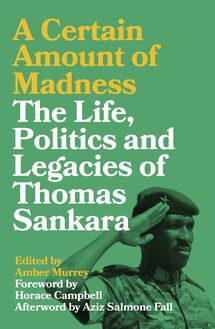-
 Univers
Univers
-
 Ebooks
Ebooks
-
 Livres audio
Livres audio
-
 Presse
Presse
-
 Podcasts
Podcasts
-
 BD
BD
-
 Documents
Documents
-
- Cours
- Révisions
- Ressources pédagogiques
- Sciences de l’éducation
- Manuels scolaires
- Langues
- Travaux de classe
- Annales de BEP
- Etudes supérieures
- Maternelle et primaire
- Fiches de lecture
- Orientation scolaire
- Méthodologie
- Corrigés de devoir
- Annales d’examens et concours
- Annales du bac
- Annales du brevet
- Rapports de stage
La lecture à portée de main
Découvre YouScribe en t'inscrivant gratuitement
Je m'inscrisDécouvre YouScribe en t'inscrivant gratuitement
Je m'inscrisEn savoir plus
En savoir plus

Description
Thomas Sankara was one of Africa's most important anti-imperialist leaders of the late 20th Century. His declaration that fundamental socio-political change would require a 'certain amount of madness' drove the Burkinabe Revolution and resurfaced in the country's popular uprising in 2014.
This book looks at Sankara's political philosophies and legacies and their relevance today. Analyses of his synthesis of Pan-Africanism and humanist Marxist politics, as well as his approach to gender, development, ecology and decolonisation offer new insights to Sankarist political philosophies. Critical evaluations of the limitations of the revolution examine his relationship with labour unions and other aspects of his leadership style. His legacy is revealed by looking at contemporary activists, artists and politicians who draw inspiration from Sankarist thought in social movement struggles today, from South Africa to Burkina Faso.
In the 30th anniversary of his assassination, this book illustrates how Sankara's political praxis continues to provide lessons and hope for decolonisation struggles today.
Foreword by Horace G. Campbell
Acknowledgements
Introduction by Amber Murrey
Part I: Life and Revolution
1. Military Coup, Popular Revolution or Militarised Revolution?: Contextualising the Revolutionary Ideological Courses of Thomas Sankara and the National Council of the Revolution - De-Valera N.Y.M. Botchway and Moussa Traore
2. The Perils of Non-Alignment: Thomas Sankara and the Cold War - Brian Peterson
3. Thomas Sankara and the Elusive Revolution - Leo Zeilig
4. When Visions Collide: Thomas Sankara, Trade Unions and the Revolution in Burkina Faso, 1983-1987 - Craig Phelan
5. Africa’s Sankara: On Pan-African Leadership - Amber Murrey
6. Who Killed Thomas Sankara? - Bruno Jaffré
7. ‘Incentivized’ Self-Adjustment: Reclaiming Sankara’s Revolutionary Austerity from Corporate Geographies of Neoliberal Erasure - Nicholas A. Jackson
Part II: Political Philosophies
8. Madmen, Thomas Sankara and Decoloniality in Africa - Ama Biney
9. With the People: Sankara’s Humanist Marxism - Ernest Harsch
10. Thomas Sankara & Tajudeen Abdul-Raheem: The Untimely Deaths of Two New Generation African Visionaries - Patricia Daley
11. Women's Freedoms are the Heartbeat of Africa's Future: A Sankarian Imperative - Patricia McFadden
12. Re-Reading Sankara’s Philosophy for a Praxeology of Debt in Contemporary Times - Sakue-C. Yimovie
13. Sankara’s Political Ideas and Pan-African Solidarity: A Perspective for Africa’s Development? - Felix Kumah-Abiwu and Olusoji Alani Odeyemi
14. ‘Revolution and Women’s Liberation Go Together’: Thomas Sankara, Gender and the Burkina Faso Revolution - Namakula E. Mayanja
Part III: Legacies
15. Balai Citoyen: A New Praxis of Citizen Fight with Sankarist Inspirations - Zakaria Soré
16. La Santé Avant Tout: Health Before Everything - T. D. Harper-Shipman
17. Social Movement Struggles and Political Transition in Burkina Faso - Bettina Engles
18. To Decolonize the World: Thomas Sankara and the ‘Last Colony’ in Africa - Patrick Delices
19. ‘Daring to Invent the Future’: Sankara’s Legacy and Contemporary Activism in South Africa - Levi Kabwato and Sarah Chiumbu
Part IV: Contestations and Homages
20. The Academy as Contested Space: Disappearing Sankara from the ‘Acceptable Avant-Garde’ - Nicholas A. Jackson
21. Art and the Construction of a ‘Sankara Myth’: A Hero Trend in Contemporary Burkinabè Urban & Revolutionary Propaganda Art - Sophie Bodénès Cohen
22. Slanted Photography: Reflections on Sankara and My Peace Corps Experience in Burkina Faso - Celestina Agyekum
23. ‘We Are the Children of Sankara’: Memories as Weapons during the Burkinabe Uprisings of 2014 and 2015 - Fiona Dragstra
Afterword by Aziz Salmone Fall
Notes on Contributors
Index
Sujets
Informations
| Publié par | Pluto Press |
| Date de parution | 20 mars 2018 |
| Nombre de lectures | 0 |
| EAN13 | 9781786802248 |
| Langue | English |
| Poids de l'ouvrage | 5 Mo |
Informations légales : prix de location à la page 0,6250€. Cette information est donnée uniquement à titre indicatif conformément à la législation en vigueur.
Extrait
A Certain Amount of MadnessBlack Critique
Series editor: Anthony Bogues
We live in a troubled world. The rise of authoritarianism marks the dominant
current political order. The end of colonial empires did not inaugurate a more
humane world; rather, the old order reasserted itself.
In opposition, throughout the twentieth century and until today, anti-racist,
radical decolonization struggles attempted to create new forms of thought.
Figures from Ida B. Wells to W.E.B. Du Bois and Steve Biko, from Claudia Jones
to Walter Rodney and Amílcar Cabral produced work which drew from the
historical experiences of Africa and the African diaspora. They drew inspiration
from the Haitian revolution, radical black abolitionist thought and practice,
and other currents that marked the contours of a black radical intellectual and
political tradition.
The Black Critique series operates squarely within this tradition of ideas and
political struggles. It includes books which foreground this rich and complex
history. At a time when there is a deep desire for change, black radicalism is
one of the most underexplored traditions that can drive emancipatory change
today. This series highlights these critical ideas from anywhere in the black
world, creating a new history of radical thought for our times.
Also available:
Red International and Black Caribbean:
Communists in New York City, Mexico and the West Indies, 1919–1939
Margaret StevensA Certain Amount
of Madness
The Life, Politics and Legacies of
Thomas Sankara
Edited by Amber Murrey
Foreword by Horace Campbell
Afterword by Aziz Salmone FallFirst published 2018 by Pluto Press
345 Archway Road, London N6 5AA
www.plutobooks.com
Copyright © Amber Murrey 2018
The right of the individual contributors to be identified as
the authors of this work has been asserted by them in accordance with the
Copyright, Designs and Patents Act 1988.
British Library Cataloguing in Publication Data
A catalogue record for this book is available from the British Library
ISBN 978 0 7453 3758 6 Hardback978 0 7453 3757 9 Paperback
ISBN 978 1 7868 0224 8 PDF eBook978 1 7868 0226 2 Kindle eBook
ISBN 978 1 7868 0225 5 EPUB eBook
This book is printed on paper suitable for recycling and made from fully
managed and sustained forest sources. Logging, pulping and manufacturing
processes are expected to conform to the environmental standards of the country of origin.
Typeset by Swales & Willis
Simultaneously printed in the United Kingdom and United States of America
Half of all author proceeds for this book are donated to the June Givanni Pan-African
Cinema Archive (www.junegivannifilmarchive.com). This is the largest archive of
Pan-African filmmaking in Europe, operating to promote Pan-African art and
philosophy to a wide audience, supporting Black artists in a colonial matrix that
otherwise marginalizes their perspectives and cultivating an appreciation for Black life
and art – all causes that were foundational to Sankara’s radical Pan-African vision.For Ndewa Jean (1948–1990)
and all the others who wept
on 15 October 1987Contents
Foreword by Horace G. Campbell xi
Acknowledgements xvii
Introduction 1
Amber Murrey
Part I Life and Revolution 19
1 Military Coup, Popular Revolution or Militarised Revolution?:
Contextualising the Revolutionary Ideological Courses of
Thomas Sankara and the National Council of the Revolution 21
De-Valera N. Y. M. Botchway and Moussa Traore
2 The Perils of Non-Alignment: Thomas Sankara and the Cold War 36
Brian Peterson
3 Thomas Sankara and the Elusive Revolution 51
Leo Zeilig
4 When Visions Collide: Thomas Sankara, Trade Unions and the
Revolution in Burkina Faso, 1983–1987 62
Craig Phelan
5 Africa’s Sankara: On Pan-African Leadership 75
Amber Murrey
6 Who Killed Thomas Sankara? 96
Bruno Jaffré
7 ‘Incentivized’ Self-Adjustment: Reclaiming Sankara’s Revolutionary
Austerity from Corporate Geographies of Neoliberal Erasure 113
Nicholas A. Jackson
Part II Political Philosophies 125
8 Madmen, Thomas Sankara and Decoloniality in Africa 127
Ama Bineyviii | Contents
9 With the People: Sankara’s Humanist Marxism 147
Ernest Harsch
10 Thomas Sankara and Tajudeen Abdul-Raheem: The Untimely
Deaths of Two New Generation African Visionaries 159
Patricia Daley
11 Women’s Freedoms are the Heartbeat of Africa's Future: A Sankarian
Imperative 170
Patricia McFadden
12 Re-Reading Sankara’s Philosophy for a Praxeology of Debt in
Contemporary Times 180
Sakue-C. Yimovie
13 Sankara’s Political Ideas and Pan-African Solidarity: A Perspective
for Africa’s Development? 194
Felix Kumah-Abiwu and Olusoji Alani Odeyemi
14 ‘Revolution and Women’s Liberation Go Together’:
Thomas Sankara, Gender and the Burkina Faso Revolution 209
Namakula E. Mayanja
Part III Legacies 223
15 Balai Citoyen: A New Praxis of Citizen Fight with
Sankarist Inspirations 225
Zakaria Soré
16 La Santé Avant Tout: Health before Everything 241
T. D. Harper-Shipman
17 Social Movement Struggles and Political Transition in Burkina Faso 255
Bettina Engels
18 To Decolonize the World: Thomas Sankara and the
‘Last Colony’ in Africa 269
Patrick Delices
19 ‘Daring to Invent the Future’: Sankara’s Legacy and
Contemporary Activism in South Africa 286
Levi Kabwato and Sarah Chiumbu
Part IV Contestations and Homages 305
20 The Academy as Contested Space: Disappearing Sankara from the
‘Acceptable Avant-Garde’ 307
Nicholas A. JacksonContents | ix
21 Art and the Construction of a ‘Sankara Myth’: A Hero Trend in
Contemporary Burkinabè Urban and Revolutionary Propaganda Art 313
Sophie Bodénès Cohen
22 Slanted Photography: Reflections on Sankara and My Peace Corps
Experience in Burkina Faso 328
Celestina Agyekum
23 ‘We Are the Children of Sankara’: Memories as Weapons during the
Burkinabè Uprisings of 2014 and 2015 335
Fiona Dragstra
Afterword 349
Aziz Salmone Fall
Notes on Contributors 361
Index 367Foreword
The Life and Legacy of Thomas Sankara
Horace G. Campbell
Thomas Sankara was born in Burkina Faso in 1949, the same year that the
Chinese Revolution succeeded in laying the foundations for a transition to
socialism. This revolution had succeeded after years of war, sacrifice and
ideological struggle. Sankara was killed in 1987, the year of the decisive military
change to defeat apartheid militarism in Africa. In the 37 years while Sankara
traversed the earth, he was shaped by the political, social and ideological
struggles in the anti-imperialist world. Sankara helped to assert the claim of
African peoples to be a part of those defining the future of humanity. In his
adult years, Sankara served as a soldier in the armed forces of Burkina Faso.
This was a branch of the imperial military chain to control the labour power
of the producing classes in Africa. He made a decisive break with this tradition.
Burkina Faso was previously called Upper Volta, one of the regions of French
colonial plunder and exploitation in Africa. Sankara had been groomed to
serve these interests but he wanted to be a decent human being in a society of
upright human beings. Hence in the period of his short leadership of Burkina
Faso, 1983-1987, he changed the name and orientation of the society to signal a
Pan-African assertion of dignity and self-confidence. These two aspects of
selfdetermination have now been inscribed within the project for the unification
and emancipation of a socialist Africa. Sankara’s life and work as a soldier left
many lessons for the African revolutionaries of today, whose task it is to speed
the break from imperial domination. The 23 chapters of this book on Sankara
remind the younger generation of what a life of dignity can do for peoples
everywhere.
birth in the shadow of revolutionary changes
Thomas Sankara was born in a territory that had been exploited by France in
its bid to represent itself as a major force in world politics. Both Britain and
France had been diminished by the Second Imperialist war and wars of national xii | Foreword
liberation from China and Vietnam to Malaysia and Egypt had weakened both
colonial powers. The United States had emerged out of World War II as the
dominant imperial force and had created the North Atlantic Treaty Organization
to defend global capital. France and Britain had mobilised colonial troops to
maintain its place at the international table of Global Capital. Colonial armies
were deployed in Vietnam and the marginalized elements of colonial societies
were recruited as foot soldiers for the dying colonial enterprise. Hence in places
such as the Central African Republic and Uganda, soldiers were recruited to
fight to save French and British capitalism. Jean Bedel Bokasa of the Central
African Republic and Idi Amin of Uganda were two archetype colonial soldiers
who fought against freedom fighters in Indo China and in Kenya. It was this
tradition of fighting against the forces of self-determination that was drilled
into soldiers all across Africa after World War II. Those soldiers who supported
the independence struggles, such as Dedan Kimathi of Kenya, had lent their
military skills and training to the task of freeing Africa.
By the time Thomas Sankara was ten years old, the Cuban Revolution had
sent a message that size was not a barrier in the fight for freedom. The emergence
of the military and political ideas of Fidel Castro and Che Guevara had become
a new source of inspiration for youths all across the anti-imperialist world. It
was this world into which Thomas Sankara grew. Upper Volta, as his home
society was called, was a reservoir of workers and soldiers from the French
imperial system. The super exploitation of the working poor and farmers in
the society was amplified by a system of migration where the poor of worked
as cheap, bonded labor in the farms of Ghana and Ivory Coast. Hence the class
character of Upper Volta was shaped by the dominance of French capital, with
French com
-
 Univers
Univers
-
 Ebooks
Ebooks
-
 Livres audio
Livres audio
-
 Presse
Presse
-
 Podcasts
Podcasts
-
 BD
BD
-
 Documents
Documents
-
Jeunesse
-
Littérature
-
Ressources professionnelles
-
Santé et bien-être
-
Savoirs
-
Education
-
Loisirs et hobbies
-
Art, musique et cinéma
-
Actualité et débat de société
-
Jeunesse
-
Littérature
-
Ressources professionnelles
-
Santé et bien-être
-
Savoirs
-
Education
-
Loisirs et hobbies
-
Art, musique et cinéma
-
Actualité et débat de société
-
Actualités
-
Lifestyle
-
Presse jeunesse
-
Presse professionnelle
-
Pratique
-
Presse sportive
-
Presse internationale
-
Culture & Médias
-
Action et Aventures
-
Science-fiction et Fantasy
-
Société
-
Jeunesse
-
Littérature
-
Ressources professionnelles
-
Santé et bien-être
-
Savoirs
-
Education
-
Loisirs et hobbies
-
Art, musique et cinéma
-
Actualité et débat de société
- Cours
- Révisions
- Ressources pédagogiques
- Sciences de l’éducation
- Manuels scolaires
- Langues
- Travaux de classe
- Annales de BEP
- Etudes supérieures
- Maternelle et primaire
- Fiches de lecture
- Orientation scolaire
- Méthodologie
- Corrigés de devoir
- Annales d’examens et concours
- Annales du bac
- Annales du brevet
- Rapports de stage
